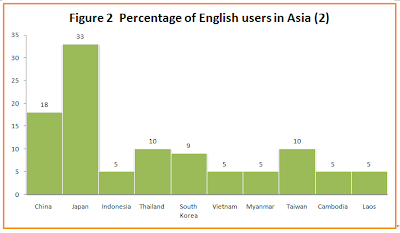From the researches done on the perceptions of English varieties of non-native English speakers, we can generalize one linguistic attitude that expanding circle speakers tend to classify different circle’s English by referring to their own linguistic properties, psychological and social functions. They tend to classify the appropriate varieties of English according to respective context and linguistic environment.
For instance, a Chinese University student will interact with his friends in Chinese Pidgin English so as to achieve the identity acceptance from his belonging social group. When he/she, equipping with efficient language proficiency, needs to interact with foreigners, this individual may tend to opt for standard British English, especially pronouncing words with Received Pronunciation, intending to gain superiority and respect from the audience.
In other words, non-native speakers will not only simply stick tightly to one single genre of English but they are able to make use of their own communication experience and creativity to suit the context of interactions.
In other words, non-native speakers will not only simply stick tightly to one single genre of English but they are able to make use of their own communication experience and creativity to suit the context of interactions.
Influence of globalization as a reason of the rise of ELF
Globalization becomes the stimulator in accelerating the speed of English variation across Asia. No matter speakers from Inner Circle, Outer Circle or Expanding Circle have more exposures and opportunities to master and use English on the Internet communication platform, such as Twitter, MSN, Facebook, you name it……
With the strong emphasis on efficiency and effectiveness of the work done subject to the utilitarian approach, the value of one language is determined by its international intelligibility and adaptability. Therefore, English has become a prominent medium of communication irrespective of the only factor of Anglo-American cultural hegemony in the 21st century. And this new generation of English genre is termed as English as a Lingua Franca, ELF.
Walking into the Starbucks café in Italy, you may wonder how Italian barristers can interact with you when you need to order one grande size of Latte with low fat milk. His mother tongue, of course, is Italian but he can still interact with you by using simple English, without thorough consideration of grammatical accuracy, pronunciation standard or other things related to English language proficiency. However, you can still interact with this gorgeous and enthusiastic young man with no obstacles of intelligibility. Actually what you say in English at that moment is English as a Lingua Franca, ELF.
ELF is a kind of English variety that is used by person interacting with others whose mother tongue is not Inner circle English. It is also treated as a cultural-free communication tool that everyone can use it when confronting people from different nations, ethnicities, and so on.
However, things are not taken for granted.
If you are one of the users or even ultras supporting English as a Lingua Franca rather than imitating the standard English style, you should think about the following questions related to the external effects brought by the rise of ELF in the era of globalization.
However, things are not taken for granted.
If you are one of the users or even ultras supporting English as a Lingua Franca rather than imitating the standard English style, you should think about the following questions related to the external effects brought by the rise of ELF in the era of globalization.
· On one hand most educators oppose ELF due to it’s deficient structure and negative effects attributed to English language teaching. However, Is it legitimate to announce that ELF is the worldwide dialect of the ‘global village’?
· Why is English portrayed as the sole Lingua Franca in the globe? Does the linguistic imperialism exist in the form of Anglo-American cultural hegemony?
· Do you think that your own local dialect can be preserved with the promotion of local varieties of English through Billingualism?
Source of photos:
http://www.ipracongressperu.com/articulos.php?idioma=in&aid=24&sec=19&aref=23
References:
Jenkins, J. (2009). The Nature of English As A LINGUA FRANCA. In Jenkins, J. (Eds.), World Englishes: a resource book for students (pp.143-150). London; New York: Routledge.
Mccrum, R. (2010, June 21). Globish powered by the Internet and the global media, English has evolved into the world’s language. Newsweek, 155(25), 36-39.
Mufwene, S.S. (2002). Colonisation, Globalisation, and the Future of Languages in the Twenty-first Century. MOST Journal on Multicultural Societies, Vol.24 (2), pp.1-48.

















